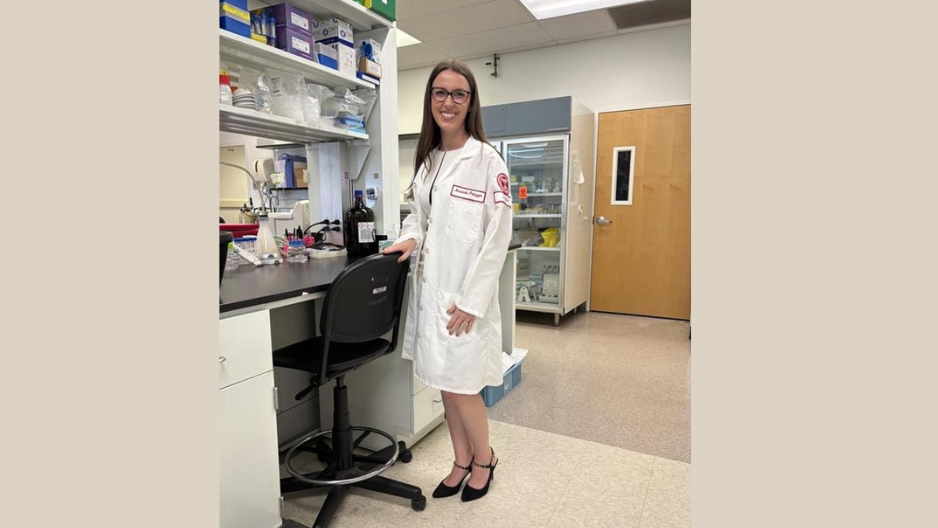Lewis Katz School of Medicine (Katz) seventh-year MD/PhD candidate Amanda Peluzzo has earned a significant distinction in her research career with the publication of her work entitled “IL-19 Is a Novel Lymphangiocrine Factor Inducing Lymphangiogenesis and Lymphatic Junctional Regula… in the American Heart Association’s Arteriosclerosis, Thrombosis, and Vascular Biology (ATVB), one of the field’s premier scientific journals. Mentored by Michael Autieri, PhD, FAHA, Professor and Director of the Lemole Center for Integrated Lymphatic and Vascular Research at the Lewis Katz School of Medicine, Peluzzo’s study explores a novel role for the cytokine interleukin-19 (IL-19) in regulating lymphatic endothelial cell behavior and lymphatic vessel function.
Discovering Something New
Peluzzo’s project began with an unexpected observation: IL-19, known primarily for its effects in anti-inflammatory and vasculogenic processes, appeared to alter gene expression in lymphatic endothelial cells. That discovery became the foundation for a multi-stage investigation that included cellular, molecular, and in vivo experiments, a level of scope and complexity rarely achieved in student-led work.
“This study started with discovering something completely novel,” Dr. Autieri explained. “Amanda’s work was exemplary in how comprehensive it was. She took that initial finding on IL-19’s effect on gene expression. She used it to design follow-up angiogenesis and lymphatic permeability experiments, ultimately testing those mechanisms in multiple mouse models. She was tenacious in her approach, her effort, and her intellectual input.”
A Scholar in the Making
For Peluzzo, the project reflects years of research training and the collaborative, mentorship-driven environment that defines the Katz MD/PhD Program.
“Being able to contribute new knowledge to the field of vascular biology is incredibly rewarding,” Peluzzo said. “This project taught me how to think independently as a scientist while also keeping patient welfare in mind. Working with Dr. Autieri and the Lemole Center team showed me how rigorous, curiosity-driven research could inform advancements in clinical medicine.”
The publication in ATVB highlights the caliber of translational research being conducted at Katz, and the opportunities students have to engage in projects that bridge basic science and clinical relevance.
The Value of Immersive Training
For Dr. Autieri, guiding MD/PhD students through full-cycle research, from hypothesis generation to publication, is both a challenge and a priority.
“I strive to provide students with a novel project they can call their own from start to finish rather than plugging them into small pieces of a much larger study,” he said. “That allows them to see how an idea becomes preliminary data, which drives a testable hypothesis. I also make sure they’re exposed to a range of experimental methods, molecular, cellular, and in vivo, because that experience is essential for future physician-scientists to understand disease mechanisms firsthand.”
He added that approach aligns closely with the mission of the Lemole Center, which emphasizes cross-disciplinary collaboration in the study of lymphatic and vascular systems, areas critical to understanding cardiovascular, immune, and metabolic health.
Mentorship and Excellence at Katz
Dr. Autieri sees Peluzzo’s success as emblematic of the research culture at Katz.
“ATVB is generally regarded as the top vascular biology journal,” he noted. “I think most investigators here strive to be outstanding in their respective fields, and this publication is representative of the kind of high-quality, high-impact research being done by both our students and mentors. It reflects the strength of our programs and the commitment across all research disciplines here at Katz.”
Looking Ahead
For Peluzzo, the experience of publishing in such a respected journal affirms her path as a future physician-scientist.
“Research is a long, challenging process, but this experience reminded me why it’s worth it,” she said. “I’m excited to continue investigating lymphatic function’s impact on pathophysiology, and how discoveries at the bench can translate into better care for patients.”
Her publication is both a scientific achievement and a reflection of the mentorship, rigor, and collaborative spirit that define Katz.

